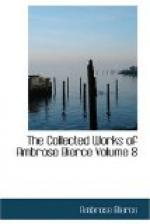The same author, by the way, says elsewhere
I would wish if I were legislator that they should adopt in France as in Germany the custom of soirees dansantes. Four times a month the young girls go with their mothers to a ball beginning at seven o’clock, ending at midnight and requiring for all expense, a violin and some glasses of water. In an adjacent room, the mothers perhaps a little jealous of the happy education of their daughters play at cards, in a third the fathers find the newspapers and talk politics. Between midnight and one o’clock all the family are reunited and have regained the paternal roof. The young girls learn to know the young men, the fatuity, and the indiscretion that follows it, become quickly odious, in a word they learn how to choose a husband. Some young girls have unfortunate love affairs, but the number of deceived husbands and unhappy households (mauvaises menages) diminishes in immense proportion.
For an iron education in cold virtue there is no school like the position of sitting master to the wall flowers at a church sociable, but it is humbly conjectured that even the austere morality of a bald headed Prude might receive an added iciness if he would but attend one of these simple dancing bouts disguised as a sweet young girl.
IX
COUNSEL FOR THE DEFENSE
Nearly all the great writers of antiquity and of the medieval period who have mentioned dancing at all have done so in terms of unmistakable favor; of modern famous authors, they only have condemned it from whose work, or from what is known of their personal character, we may justly infer an equal aversion to pretty much everything in the way of pleasure that a Christian needs not die in order to enjoy English literature—I use the word in its noble sense, to exclude all manner of preaching, whether clerical or lay—is full of the dance; the sound of merry makers footing it featly to the music runs like an undertone through all the variations of its theme and fills all its pauses.
In the “Miller’s Tale,” Chaucer mentions dancing among the accomplishments of the parish clerk, along with blood letting and the drawing of legal documents:
A merry child he was so God
me save,
Wel coud he leten blood and
clippe and shave,
And make a chartre of land,
and a quitance,
In twenty maners could he
trip and dance,
After the scole of Oxenforde
tho
And with his legges casten
to and fro[A]
[Footnote A: On this passage Tyrwhit makes the following judicious comment: The school of Oxford seems to have been in much the same estimation for its dancing as that of Stratford for its French—alluding of course to what is, said in the Prologue of the French spoken by the Prioress:
And French she spoke full fayre and fetisly
After the scole of Stratford atte bowe
For French of Paris was to hire unknowe]




